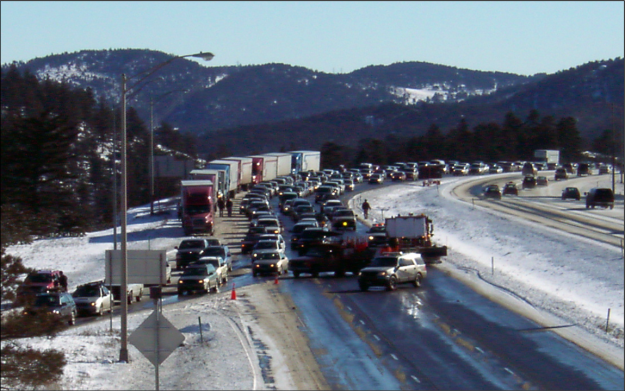Widgetized Section
Go to Admin » Appearance » Widgets » and move Gabfire Widget: Social into that MastheadOverlay zone
Colorado lawmakers reach deal on transportation sales tax ballot measure

I-70 Coalition photo
Lawmakers on Wednesday reached a bipartisan agreement on a bill to float a possible sales tax ballot measure this November to fund Colorado’s crumbling transportation infrastructure.
Long gridlocked on how best to fund serious funding deficits for basic road and bridge repairs, Republicans and Democrats have battled for years over how to come up with billions of dollars requested by the Colorado Department of Transportation.
Gas taxes have been stuck at the same levels since the 1990s, and now lawmakers want to impose a .62 percent sales tax statewide. The bill, co-sponsored by Vail Valley state Rep. Diane Mitsch Bush, has to clear the House and Senate before going to a public vote in November.
The sales tax would increase from 2.9 percent to 3.52 percent and generate $680 million a year
Here’s a joint press release on the agreement:
(March 8) – In a breakthrough achieved after months of negotiations, Speaker Crisanta Duran and Senate President Kevin Grantham introduced a bill this afternoon to address the state’s immediate and long-range transportation needs, give city and county governments a boost for local transportation priorities and ensure that more Coloradans across the state have access to transportation options.
HB17-1242 is sponsored by Speaker Duran, President Grantham and the chairs of the House and Senate transportation committees — Rep. Diane Mitsch Bush, D-Steamboat Springs, and Sen. Randy Baumgardner, R-Hot Sulphur Springs.
If approved by the House and Senate, the bill would place on the November 2017 ballot a measure to increase the state sales tax and make a series of reductions in state vehicle registration fees.
Roughly $680 million in new and existing resources would be made available for the state’s transportation needs, to be leveraged for up to $3.5 billion in bonding for projects across the state, if a 0.62 percent sales tax increase is approved by the voters in November.
Much of the money would be distributed to city and county governments for their local transportation priorities. Local governments would be able to put the funding toward their most pressing local needs.
“Every county and city in Colorado will share in the benefits from this transportation package,” Speaker Duran said. “And we will insist on transparency and accountability, so that voters will know where their dollars are going and how they will be used. This package, if approved by the legislature and the voters, would be a major step forward for this state and firmly position us for growth and prosperity for the next 20 years.”
“Introduction of this transportation bill doesn’t mean we’ve arrived, just that we’ve hit another important mile marker on the long and winding road to a long-term transportation fix for Colorado,” President Grantham said. “This bill probably isn’t what the final product will look like, because what’s being introduced is a work in progress and there’s still a lot of debate, compromise and hard work ahead before we’ll have a proposal good enough to pass muster with voters. But I’m optimistic that we’ll get there in the end.”
The bill would address Colorado’s worsening problem of rapid population and economic growth without matching upgrades to our transportation system. CDOT estimates $9 billion is needed to repair crumbling roads, perform needed maintenance on bridges and relieve worsening traffic congestion that reduces Colorado’s productivity and damages our quality of life.
Here’s a statement, issued Thursday, from CDOT Executive Director Shailen Bhatt:
“CDOT is pleased that Speaker Duran, President Grantham, Senator Baumgartner and Representative Mitsch-Bush have crafted a bi-partisan solution to address how our transportation system keeps Colorado moving. We look forward evaluating the proposal and participating in the crafting of the final legislation.
“Colorado’s state transportation system is faced with a $1 billion per year funding shortfall, which limits CDOT’s ability to address congestion, mobility, and safety challenges. This initiative has the potential to save lives and improve the state’s economic vibrancy. It will fund projects that address mobility issues on our major interstate highways as well a rural roads, add transit and transportation choice around the state, and provide local communities the flexibility and resources for their needs.”
Colorado’s mainstream conservation community, at least initially, seems to support the measure. Here’s a release from Conservation Colorado:
Conservation Colorado Supports Bipartisan Transportation Funding Bill
Senate President Kevin Grantham and House Speaker Crisanta Duran this evening announced H.B. 1242, a bill to fund transportation in Colorado. Pete Maysmith, Executive Director of Conservation Colorado, stated:
We are pleased to see Speaker Duran and President Grantham working together to develop legislation to address our long-standing transportation needs. While we’re still analyzing the details of the bill, we are encouraged by the significant amount of dedicated funding to multimodal transportation as well as provisions giving local governments the freedom and choice to spend money on these options.
As the second-fastest growing state in the nation, we must invest in modern transportation options, especially those that are designed to move people, not just cars. Coloradans across the state deserve a transportation system that reflects the future.
More information about multimodal options:
-
Dozens of local officials, from both sides of the aisle and from rural and urban communities, sent a letter to leadership last week urging “significant dedicated funding for multimodal transportation options.”
-
Multimodal options are critical to generating the public support needed to pass a measure should it come before voters. Recent polling from the Colorado Contractors Association found that more than 70 percent of voters say they are more likely to support a measure when told that it includes funding dedicated to multimodal options.
-
Multimodal options are severely underfunded (a recent study found Colorado is ranked 29th among states in per capita funding for transit, investing just one-twentieth of the national average).


